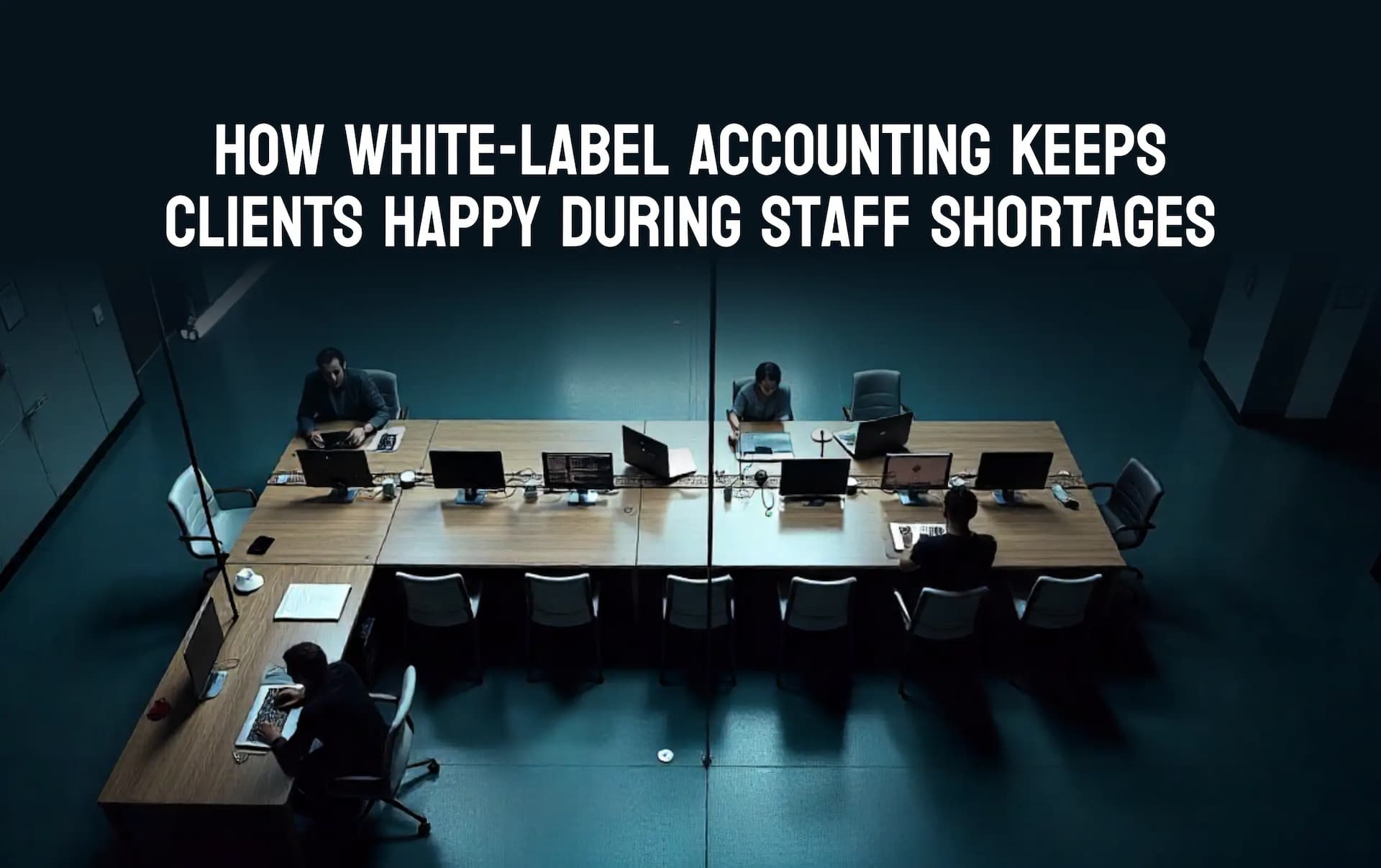
Picture this: a senior staffer quits, another goes on leave, and suddenly you’re staring down month-end with half the crew you need. Deadlines pile up, emails go unanswered, mistakes creep into reports. And while you’re scrambling to hold things together, your clients aren’t thinking about your staffing crisis. They’re thinking, “Can I still rely on this firm?”
That’s the real danger of a staffing crunch, it’s not just missed deadlines, it’s dented trust. Clients don’t see your org chart; they feel the slowdown in response times, the wobble in accuracy, and the lack of continuity. And once their confidence cracks, it’s hard to patch it back.
This is exactly where white-label accounting comes in. Think of it as your invisible backup team specialists who plug into your systems and work under your brand, keeping everything running smoothly without your clients ever knowing there was a staffing gap in the first place.
The Harsh Reality: Staff Shortages Hit Trust First, Not Utilization
Here’s the thing, clients don’t care how many people you have on payroll. They care if you’re answering their emails, keeping their books clean, and giving them clarity when things get messy.
When you’re short-staffed, the first cracks show up in:
• Response time: That email that usually takes 2 hours to answer now takes 2 days.
• Accuracy: Reviewers are rushing, and little mistakes start sneaking in.
• Continuity: A client’s favorite bookkeeper goes on leave, and suddenly everything “feels different.”
And it’s not just a one-off problem. The U.S. accounting industry is in a long-term talent crunch:
• The accountant and auditor workforce dropped nearly 10% from 2019–2024 because of retirements and fewer new entrants (Reuters).
• According to the AICPA Trends Report 2023, fewer graduates are sitting for the CPA exam, tightening the pipeline further.
• A recent survey showed 83% of CFOs struggle to find qualified accounting talent up from 70% in 2022.
Staff shortages aren’t just bad luck; they’re part of the environment we’re all working in. And if you don’t find a buffer, your client’s trust will take the hit.
White-Label Accounting: Your Invisible Safety Net
So, what exactly is white-label accounting?
It’s when an external team handles accounting work under your brand, using your systems, and following your quality standards.
To your clients, nothing changes, they still see reports, deliverables, and emails with your name on them. Behind the curtain, though, a white-label partner is doing the heavy lifting:
• Recurring work: Bookkeeping, AP/AR, reconciliations, payroll prep, month-end close.
• Project bursts: Clean-ups, catch-ups, migrations, and audits.
• Specialist tasks: Consolidations, revenue recognition schedules, lease accounting.
It’s like having an “elastic bench” of accountants you can scale up or down without the pain of hiring and firing.
Why It Protects Client Relationships
Here’s where the rubber meets the road white-label isn’t just about “getting the work done.” It’s about keeping clients feeling secure, valued, and taken care of.
1. You Stay Responsive (Even When You’re Swamped)
Clients forgive a late report more easily than a silent inbox. When white-label teams cover production, your client-facing staff stay free to respond quickly. Research shows responsiveness is one of the top drivers of client satisfaction.
2. Accuracy Doesn’t Slip
When senior staff are overloaded, review quality drops. With white-label pods, you’ve got a second set of eyes working from your SOPs and checklists. That means fewer errors slipping through, even when you’re thin on reviewers.
3. Continuity Beats “Favorite People”
We all know the client who loves “their” bookkeeper. But what happens when that person takes leave or quits? White-label partners build team-based delivery, not person-based delivery, so clients get consistency, no matter who’s on vacation.
4. Elasticity for Busy Seasons
Year-end, tax season, or onboarding a big new client? Instead of drowning your staff in overtime or rushing a hire, you scale your white-label team up for 30–90 days, then scale down after. No awkward “hire now, fire later” cycles.
What to Outsource vs. Keep In-House
Quick rule of thumb:
• Outsource: Repeatable, rules-based, template-driven tasks.
• Keep In-House: Advisory, judgment-heavy calls, and direct client conversations.
Clients don’t care who reconciles their AP. They do care who explains their cash flow runway. That’s why white-label lets you keep the relationship glue in-house while offloading the grind.
But Isn’t Outsourcing Risky? Nope, If You Do It Right
I get it. The word “outsourcing” can raise eyebrows. But white-label done right actually reduces risk because it forces structure and accountability:
• SOPs + checklists: Every task has a playbook and deadline.
• Two-person integrity: Maker-checker separation in your GL.
• Security basics: Role-based access, NDAs, SSO, and data controls.
• Clear communication: Weekly huddles, monthly reviews, quarterly refresh.
In fact, a lot of Big 4 firms already run this blended model U.S. leads + India-based pods because it delivers consistency and scalability (Reuters).
The ROI: Numbers Don’t Lie
Let’s put real numbers on it.
Say you’re short of one senior and one staff accountant for three months:
• Without white-label: You pay overtime, hire a recruiter, lose time onboarding, and risk write-offs from delays.
• With white-label: You plug in a pod of 2–3 FTE equivalents at a fixed fee, typically 15–30% cheaper than local hires.
The kicker? Partners get back time to do proactive client work, forecasting, tax planning, cash flow sessions. And proactive outreach is one of the strongest retention levers in professional services.
Bottom line
Staff shortages are tough, but they don’t have to shake your client relationships. At the end of the day, clients aren’t judging you by how many people you have on payroll; they’re judging you by how reliable you are.
That’s the beauty of white-label accounting, it gives you invisible muscle behind the scenes, so your clients still experience consistency, accuracy, and confidence, even when your in-house team is stretched thin.
Think of it like a safety net. Your people stay focused on conversations, strategy, and insights, while the heavy lifting gets handled quietly in the background. The result? Fewer late nights for your staff, smoother delivery for your clients, and trust that doesn’t crack under pressure.
So, the next time you feel like you’re running on fumes, remember you don’t need to burn out your team or scramble for last-minute hires. You just need the right backup.

Shekhar Mehrotra
Founder and Chief Executive Officer
Shekhar Mehrotra, a Chartered Accountant with over 12 years of experience, has been a leader in finance, tax, and accounting. He has advised clients across sectors like infrastructure, IT, and pharmaceuticals, providing expertise in management, direct and indirect taxes, audits, and compliance. As a 360-degree virtual CFO, Shekhar has streamlined accounting processes and managed cash flow to ensure businesses remain tax and regulatory compliant.
You might also like:
Listen Exclusive Podcast On

